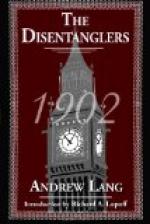These remarks, though of an obsolete and exaggerated transatlantic idiom, were murmured in the softest of tones, in the most English of silken accents, by the most beautiful of young ladies. She occupied the client’s chair in Merton’s office, and, as she sat there and smiled, Merton acknowledged to himself that he had never met a client so charming and so perplexing.
Miss McCabe had been educated, as Merton knew, at an aristocratic Irish convent in Paris, a sanctuary of old names and old creeds. This was the plan of her late father (spoken of by her as Pappa), an educational reformer of eccentric ideas, who, though of ancient (indeed royal) Irish descent, was of American birth. The young lady had thus acquired abroad, much against her will, that kind of English accent which some of her countrywomen reckon ‘affected.’ But her intense patriotism had induced her to study, in the works of American humourists, and to reproduce in her discourse, the flowers of speech of which a specimen has been presented. The national accent was beyond her, but at least she could be true to what she (erroneously) believed to be the national idiom.
‘Your case is peculiar,’ said Merton thoughtfully, ’and scarcely within our province. As a rule our clients are the parents, guardians, or children of persons entangled in undesirable engagements. But you, I understand, are dissatisfied with the matrimonial conditions imposed by the will of the late Mr. McCabe?’
‘I want to take my own pick out of the crowd—’ said Miss McCabe.
‘I can readily understand,’ said Merton, bowing, ’that the throng of wooers is enormous,’ and he vaguely thought of Penelope.
’The scheme will be popular. It will hit our people right where they live,’ said Miss McCabe, not appropriating the compliment. ’You see Pappa struck ile early, and struck it often. He was what our Howells calls a “multimillionaire,” and I’m his only daughter. Pappa loved me, but he loved the people better. Guess Pappa was not mean, not worth a cent. He was a white man!’
Miss McCabe, with a glow of lovely enthusiasm, contemplated the unprecedented whiteness of the paternal character.
’"What the people want,” Pappa used to say, “is education. They want it short, and they want it striking.” That was why he laid out five millions on his celebrated Museum of Freaks, with a staff of competent professors and lecturers. “The McCabe Museum of Natural Varieties, lectures and all, is open gratuitously to the citizens of our Republic, and to intelligent foreigners.” That was how Pappa put it. I say that he dead-headed creation!’
‘Truly Republican munificence,’ said Merton, ’worthy of your great country.’
‘Well, I should smile,’ said Miss McCabe.
’But—excuse my insular ignorance—I do not exactly understand how a museum of freaks, admirably organised as no doubt it is, contributes to the cause of popular education.’




